liver support
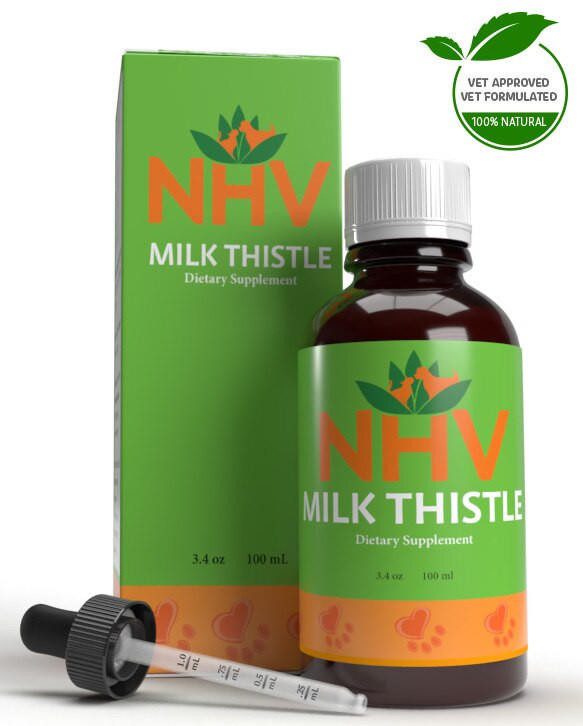
free shipping over $100 (USA & Canada)
1-877-937-4372 the pet expert hotline
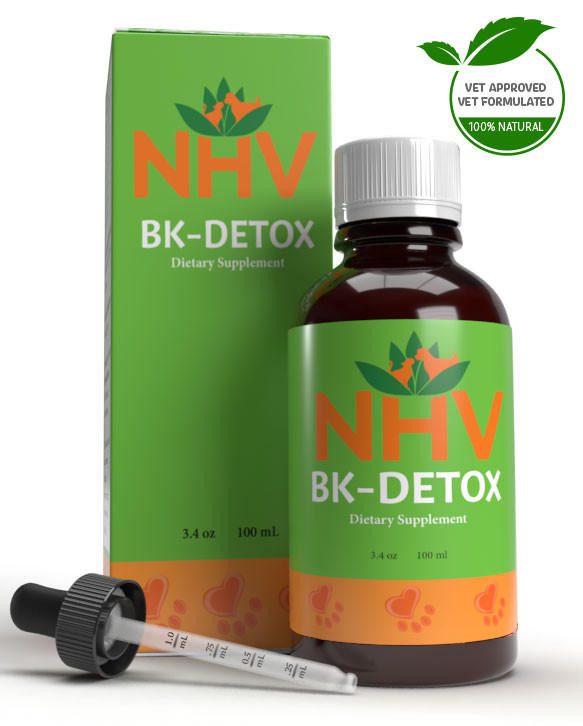
Cat Immune System Booster, Cancer Support, Gentle Detox, and Blood Cleanser


With the holidays just around the corner, thinking of how to keep our pets safe from toxic foods is more important than ever. Some foods can be toxic to pets and cause more damage than just an upset stomach, which is why we created a list of 12 foods you didn’t know are toxic to pets.
Here are some examples of toxic foods and plants that can harm your loved pet.
These can be fatal to cats and dogs, as they have a toxic ingredient in them. Ingesting raisins and grapes, even in small amounts, can lead to acute (sudden) kidney failure and death. Keep your furbabies away from fruitcakes this holiday season, and any food that has grapes or dehydrated fruits.
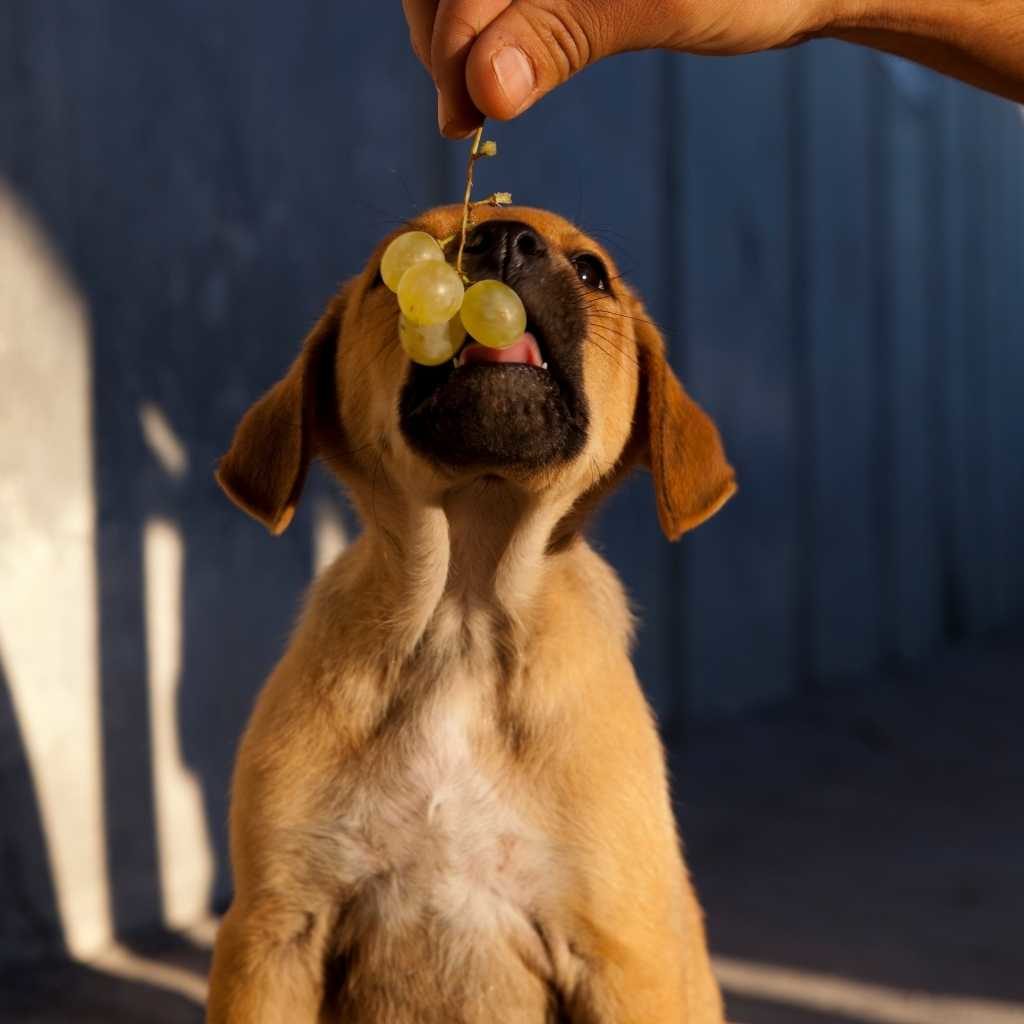
Everybody loves cookies and cakes. It is no different with our furry companions. Some ingredients in these, however, like raw eggs and sugar can cause an upset stomach and more serious digestive issues.
Your furkiddos don’t need to skip out on the tasty treats! It is safer to give them premade biscuits specifically made for pets or make sure your goodies are fully baked. You can make them special treats at home like this Banana & Oat cookie, or if your furbaby prefers, a Peanut Butter cookie.
Chocolates is a huge fan favorite. Although we can experience the wonders of chocolates, there is an ingredient called theobromine that is highly toxic for dogs and cats. Poisoning by theobromine can lead to heart, liver, and kidney failures, seizures, and potentially death. Make sure to keep all the chocolate boxes hidden from your kitties and pups. Save them all for yourself and the human members of your family.
Poisoning by theobromine can lead to heart, liver, and kidney failures, seizures, and potentially death.

Sage and mint taste and smell good to us humans and be attractive to our furkiddos, but, they are something pet parents should be cautious of. Our pets, especially cats, are sensitive to sage and mint as they may cause stomach upset and depression of the central nervous system. You can find more plants that may be dangerous to your pet here.
Poinsettias are one of the most beautiful plants and are fairly common during the holiday season. It works perfectly as a decoration and as a gift but should be kept away from furkiddos.
Although some plants and herbs are dangerous to our pets, there are many that can be incredibly beneficial to their health and wellness. That is why a holistic veterinarian and master herbalist have formulated our supplements thinking of the safety and well-being of our beloved furbabies.
All parts of the onion are toxic to dogs. Garlic (allium family) is also harmful. When they ingest either of these two common ingredients, they can develop hemolytic anemia that may lead to the destruction of the red blood cells, causing severe health problems. These are daily ingredients that are found in many items that we may feed our pets absentmindedly, such as store-bought broths and seasonings so extra attention is required to not let accidentally feed them to our pets.
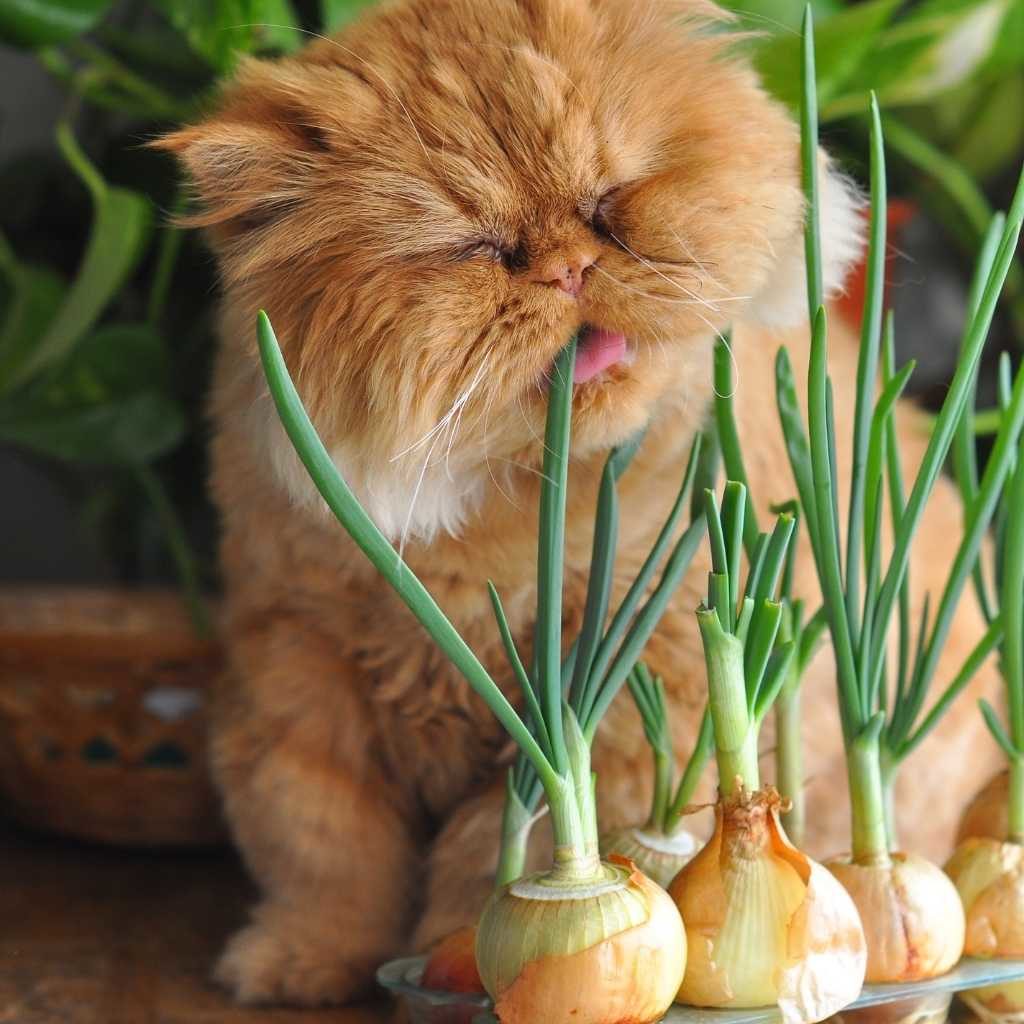
Apples are delicious. They are crunch, juicy, and healthy for us. Most pets love them as treats and giving them small pieces of apples is totally fine, however, make sure you take out all the seeds. Apple seeds are especially toxic for dogs, as they contain a small amount of cyanide that can poison them, potentially leading to death.
Like the potential hazards that chocolate can offer to pets, other types of candy can be equally harmful. Gums can cause blockage in the stomach and intestines. Chewing gums and candies also contain xylitol, which is a popular sweetener used to replace sugar, which is highly poisonous to pets.
Some products where you can find xylitol are baked goods, juice drinks, chewing gum, candy, human mouthwashes and toothpaste (always use the pet mouthwash and toothpaste), jellies, and jams, cereal, among other products. Candies in general are made for human consumption only.
Coffee is a great way to start the day for humans. Pets are more sensitive to the effects of caffeine and can be poisoned by ingesting even small amounts, so it is important to keep them away from coffee, tea, and any product that may contain caffeine.
Humans are the only mammals that keep drinking milk at all periods of life. In nature, mammals are weaned and do not drink milk if they can eat for themselves. Unfortunately, there is a culture of giving milk, especially for cats, as a treat. Too much dairy can cause diarrhea and stomach upset, both in dogs and cats, and some may even develop lactose intolerance and be allergic to dairy products.
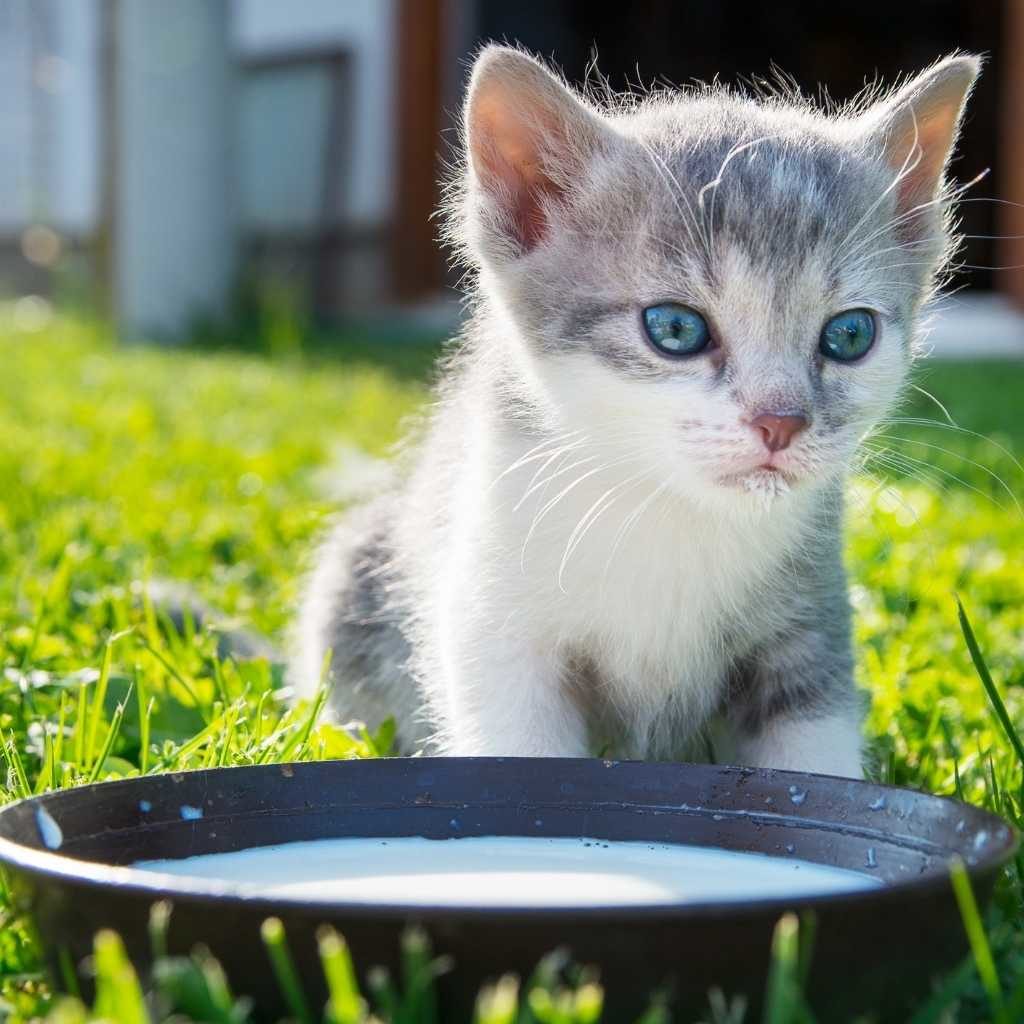
Cooked bones are hard and splinter when they break. This is especially dangerous for pets that eat them, as they can cause severe obstructions and lacerations in the GI system. If that happens, it is treated as a surgical emergency with a high risk of death.
With all these foods, during holiday or any time of the year, in case of ingestion, look for a veterinarian as soon as possible. And also, with the right support, you can help protect your pet’s liver and kidneys, and help to detox their system with Milk Thistle and BK-Detox.
NHV Milk Thistle (Silybum marianum) is a herb that is native to the Mediterranean. It has been used for centuries for its medicinal properties. Studies have shown that Milk Thistle decreases or even can reverse damage to the liver which may be caused by the use of prescription medications, heavy metals, toxic agents, or household pollutants. The active compound in Milk Thistle, silymarin, helps to prevent toxins from binding to the liver. This is not only beneficial to the liver itself, but to many other bodily functions.
BK-Detox helps to support the immune system and promotes detoxification of the vital organs and the blood.
We are always here to help you and our fur family!
liver support

100% Natural Liver and Kidney Detox and Cancer Support in Cats
buy 2 and save $3
3 month supply for a small to medium size pet
A popular herb among conventional and holistic veterinarians, Milk Thistle is often recommended for cats who have liver disorders, are fighting cancer, diabetes, kidney issues, gallbladder and bile duct issues, as well as hyperthyroidism.

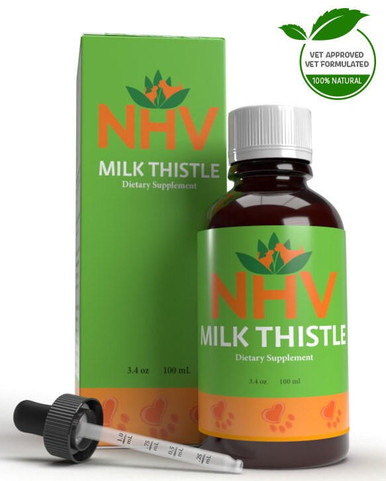
A popular herb among conventional and holistic veterinarians, Milk Thistle is often recommended for cats who have liver disorders, are fighting cancer, diabetes, kidney issues, gallbladder and bile duct issues, as well as hyperthyroidism.

Milk thistle, also known as Silybum Marianum is an herb that has been used for thousands of years by humans for its powerful medicinal properties. The active ingredient is Silymarin which contains flavonoids that have many beneficial properties including:
Milk thistle is one of the few herbs that have no equivalent in conventional medicine and has many uses. You can read about the many applications of Milk Thistle for cats and dogs on Dr. Hillary Cook's blog.
Milk Thistle for Liver Function
Milk Thistle for cats with liver disease is glycerin-based and safe for long-term use. This potent herbal formula provides excellent proactive support and can be taken in conjunction with conventional treatment.
Milk Thistle for Kidney Function
Milk Thistle for Anti-Cancer Support
Milk Thistle may also be beneficial to cats undergoing chemotherapy as Silymarium may enhance the activity of certain chemo drugs.
You can read Peachez's Story with Milk Thistle for cats and how it helped her with cancer and liver problems.
NHV’s certified organic Milk Thistle is a safe herb that is recommended and used by holistic practitioners. All of our products are all-natural and formulated by veterinarians with a focus on comprehensively supporting the health and well-being of your feline family member.
If you have questions about Milk Thistle or any of our plant-based products, ask an NHV expert because at NHV we want your kitty’s health to be purrfect!
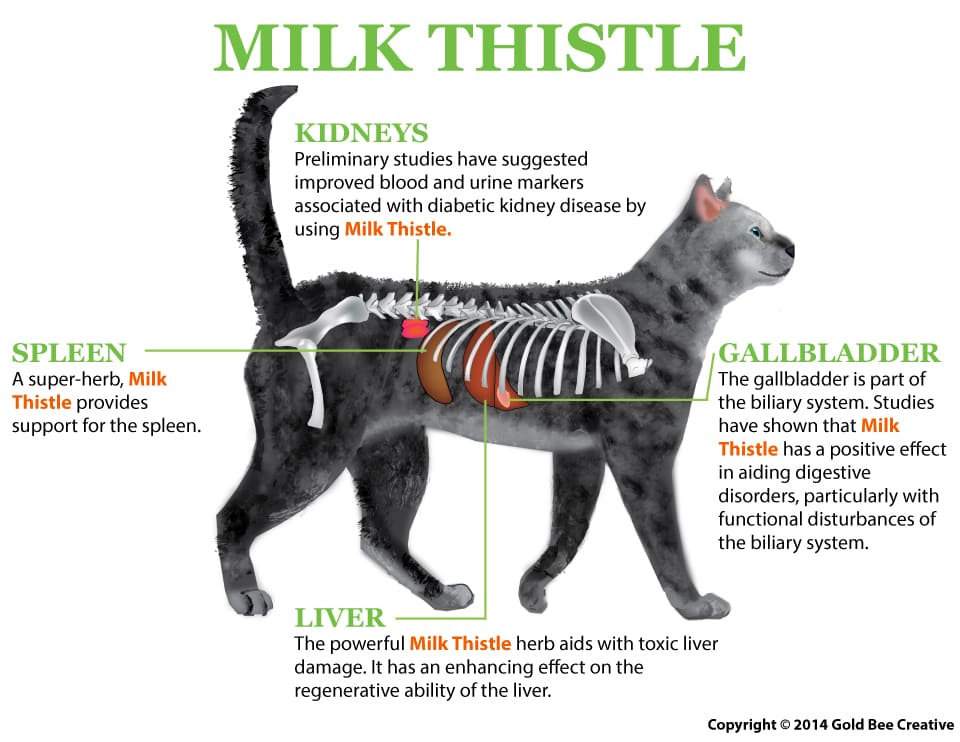
NHV’s Milk Thistle for Cats contains just one ingredient.
Select your pet's weight to determine the correct dose.
To be taken twice daily. Determine your pet’s weight and then use the easy chart below to determine the correct dose. This is the minimum dosage.
Pet's Weight Dosage
0 - 15 lb = 0.5 ml
16 - 30 lb = 1.0 ml
31 - 45 lb = 1.5 ml
46 - 60 lb = 2.0 ml
61 - 75 lb = 2.5 ml
Over 75 lb = 3.0 ml
How to Administer
Shake well before use. The easiest method is to use the dropper provide and places the drops into your pet’s food or favorite treat. You can also use the dropper and squirt directly into the pet’s mouth.
Some pets can be finicky, if this occurs consider hiding the drops in foods most pet’s love such as fish, chicken or yogurt or a favorite treat. If your pet only eats dry food then soak a few kibbles at feeding time.
For Best Results
Herbal dietary supplements are beneficial to the health and wellbeing of your pet and are safe for long-term use. Every pet responds to natural herbal supplements differently, therefore it is important to be consistent and administer the product daily. Supplements generally take two to four weeks to take effect, however this will vary from one animal to the next.
Product Storage
All NHV Natural Pet Products are pure herbal extracts and contain no artificial additives, preservatives or coloring. Shelf life after opening is 6 months and must be refrigerated after opening.
Cautions and Contraindications
Do not use Milk Thistle in pregnant or nursing animals. Speak to your vet before using our products. A second visit is recommended if your pet’s condition does not improve, or deteriorates after continued use of the supplements.
All information provided by NHV Natural Pet Products is for educational purposes only.
Milk thistle, also known as Silybum Marianum is an herb that has been used for thousands of years by humans for its powerful medicinal properties. The active ingredient is Silymarin which contains flavonoids that have many beneficial properties including:
Milk thistle is one of the few herbs that have no equivalent in conventional medicine and has many uses. You can read about the many applications of Milk Thistle for cats and dogs on Dr. Hillary Cook's blog.
Milk Thistle for Liver Function
Milk Thistle for cats with liver disease is glycerin-based and safe for long-term use. This potent herbal formula provides excellent proactive support and can be taken in conjunction with conventional treatment.
Milk Thistle for Kidney Function
Milk Thistle for Anti-Cancer Support
Milk Thistle may also be beneficial to cats undergoing chemotherapy as Silymarium may enhance the activity of certain chemo drugs.
You can read Peachez's Story with Milk Thistle for cats and how it helped her with cancer and liver problems.
NHV’s certified organic Milk Thistle is a safe herb that is recommended and used by holistic practitioners. All of our products are all-natural and formulated by veterinarians with a focus on comprehensively supporting the health and well-being of your feline family member.
If you have questions about Milk Thistle or any of our plant-based products, ask an NHV expert because at NHV we want your kitty’s health to be purrfect!

NHV’s Milk Thistle for Cats contains just one ingredient.
Select your pet's weight to determine the correct dose.
To be taken twice daily. Determine your pet’s weight and then use the easy chart below to determine the correct dose. This is the minimum dosage.
Pet's Weight Dosage
0 - 15 lb = 0.5 ml
16 - 30 lb = 1.0 ml
31 - 45 lb = 1.5 ml
46 - 60 lb = 2.0 ml
61 - 75 lb = 2.5 ml
Over 75 lb = 3.0 ml
How to Administer
Shake well before use. The easiest method is to use the dropper provide and places the drops into your pet’s food or favorite treat. You can also use the dropper and squirt directly into the pet’s mouth.
Some pets can be finicky, if this occurs consider hiding the drops in foods most pet’s love such as fish, chicken or yogurt or a favorite treat. If your pet only eats dry food then soak a few kibbles at feeding time.
For Best Results
Herbal dietary supplements are beneficial to the health and wellbeing of your pet and are safe for long-term use. Every pet responds to natural herbal supplements differently, therefore it is important to be consistent and administer the product daily. Supplements generally take two to four weeks to take effect, however this will vary from one animal to the next.
Product Storage
All NHV Natural Pet Products are pure herbal extracts and contain no artificial additives, preservatives or coloring. Shelf life after opening is 6 months and must be refrigerated after opening.
Cautions and Contraindications
Do not use Milk Thistle in pregnant or nursing animals. Speak to your vet before using our products. A second visit is recommended if your pet’s condition does not improve, or deteriorates after continued use of the supplements.
All information provided by NHV Natural Pet Products is for educational purposes only.
immune support
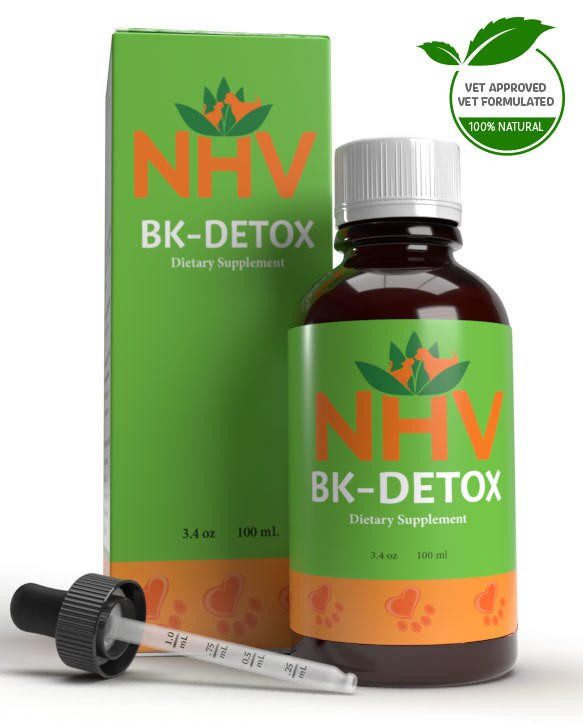
Detoxifies the Blood and Organs, Boosts (support) the Immune System
buy 2 and save $3
3 month supply for a small to medium size pet.
A dog immune support supplement that helps with compromised immune systems that may be fighting cancer, skin problems or heartworms.

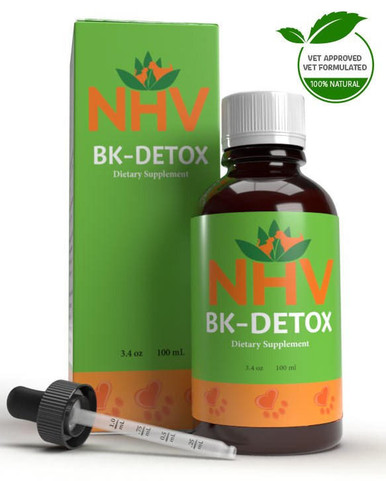
A dog immune support supplement that helps with compromised immune systems that may be fighting cancer, skin problems or heartworms.

Dogs live in a world full of pollutants that they breathe, ingest, and play in every day. Protect them with BK Detox, an all-natural dog immune system (support) booster and detoxifier specially formulated to restore balance, regulate the immune system, and help your pet live a healthier, happier life.
What many people think of as boosting the immune system is actually balancing the immune system. A balanced immune response is the healthiest for helping your pet’s body detect and respond to toxins and infections.
Your dog’s body filters blood impurities through the liver and other vital organs of a dog’s body and then supplies nutrients and oxygen to the cells and tissue, which plays an important role in keeping your dog healthy. BK Detox dog immune system support and detoxifier will help flush toxins out of your pet’s blood and vital organs. When the immune system is compromised, toxins can accumulate in your dog and cause problems including liver disorders, urinary tract infections, skin allergies, tumors, bad breath, and respiratory issues.
Red Clover – A blood-purifying herb with antibiotic and anti-inflammatory properties. It promotes cleansing and the elimination of toxins and deposits through diuretic and expectorant activity.
Cleavers – A tonic that increases the circulation of lymph-impaired areas of the body and aids in the drainage of lymph-engorged cysts, tumors, and inflamed tissues of the urinary tract.
Neem – Has powerful blood purifying and detoxifying effects.
Oregon Grape – Supports and improves digestion by helping rid the body of waste and toxins in the blood.
Gotu Kola – Known for its cleansing, diuretic, and strong antioxidant properties.
Buckthorn – A gentle laxative and blood-cleansing tonic.
Burdock – A highly effective blood purifier abundant in calcium, phosphorus, iron, thiamine, and riboflavin. Supports the entire body while gently eliminating toxic build-up.
Sarsaparilla – A cleansing herb that stimulates the kidneys to flush deposits and clear toxins.
Echinacea Angustifolia – Boosts a dog’s immune system and stimulates the body’s defense mechanism.
Chaparral – A blood purifying antioxidant-rich in amino acids.
Prickly Ash – A tonic that stimulates the entire lymphatic system to encourage the elimination of toxic metabolites.
Select your pet's weight to determine the correct dose.
Bk Detox can be used as a detoxifier every 6 months. For best results administer the recommended dosage until the bottle is finished.
To be taken twice daily. Determine your pet’s weight and then use the easy chart below to determine the correct dose. This is the minimum dosage.
Pet's Weight Dosage
0 - 15 lb = 0.5 ml
16 - 30 lb = 1.0 ml
31 - 45 lb = 1.5 ml
46 - 60 lb = 2.0 ml
61 - 75 lb = 2.5 ml
Over 75 lb = 3.0 ml
For small animals (rabbits, ferrets), avians and reptiles use 1 drop for every 2 lb of body weight.
How to Administer: Shake well before use. The easiest method is to use the dropper provided and place the drops into your pet’s food or favorite treat. You can also use the dropper and squirt directly into the pet’s mouth. Some pets can be finicky, if this occurs consider hiding the drops in foods most pet’s love such as fish, chicken, yogurt, or a favorite treat. If your pet only eats dry food then soak a few kibbles at feeding time.
For Best Results
Herbal dietary supplements are beneficial to the health and well-being of your pet and are safe for long-term use. Every pet responds to natural herbal supplements differently, therefore it is important to be consistent and administer the product daily. Supplements generally take two to four weeks to take effect, however this will vary from one animal to the next.
Product Storage
All NHV Natural Pet Products are pure herbal extracts and contain no artificial additives, preservatives, or coloring. Shelf life after opening is 6 months and must be refrigerated after opening.
Cautions and Contraindications
Do not use BK Detox in pregnant or nursing animals.
Speak to your vet before using our products. A second visit is recommended if your pet’s condition does not improve, or deteriorates after continued use of the supplements.
All information provided by NHV Natural Pet Products is for educational purposes only.
Dogs live in a world full of pollutants that they breathe, ingest, and play in every day. Protect them with BK Detox, an all-natural dog immune system (support) booster and detoxifier specially formulated to restore balance, regulate the immune system, and help your pet live a healthier, happier life.
What many people think of as boosting the immune system is actually balancing the immune system. A balanced immune response is the healthiest for helping your pet’s body detect and respond to toxins and infections.
Your dog’s body filters blood impurities through the liver and other vital organs of a dog’s body and then supplies nutrients and oxygen to the cells and tissue, which plays an important role in keeping your dog healthy. BK Detox dog immune system support and detoxifier will help flush toxins out of your pet’s blood and vital organs. When the immune system is compromised, toxins can accumulate in your dog and cause problems including liver disorders, urinary tract infections, skin allergies, tumors, bad breath, and respiratory issues.
Red Clover – A blood-purifying herb with antibiotic and anti-inflammatory properties. It promotes cleansing and the elimination of toxins and deposits through diuretic and expectorant activity.
Cleavers – A tonic that increases the circulation of lymph-impaired areas of the body and aids in the drainage of lymph-engorged cysts, tumors, and inflamed tissues of the urinary tract.
Neem – Has powerful blood purifying and detoxifying effects.
Oregon Grape – Supports and improves digestion by helping rid the body of waste and toxins in the blood.
Gotu Kola – Known for its cleansing, diuretic, and strong antioxidant properties.
Buckthorn – A gentle laxative and blood-cleansing tonic.
Burdock – A highly effective blood purifier abundant in calcium, phosphorus, iron, thiamine, and riboflavin. Supports the entire body while gently eliminating toxic build-up.
Sarsaparilla – A cleansing herb that stimulates the kidneys to flush deposits and clear toxins.
Echinacea Angustifolia – Boosts a dog’s immune system and stimulates the body’s defense mechanism.
Chaparral – A blood purifying antioxidant-rich in amino acids.
Prickly Ash – A tonic that stimulates the entire lymphatic system to encourage the elimination of toxic metabolites.
Select your pet's weight to determine the correct dose.
Bk Detox can be used as a detoxifier every 6 months. For best results administer the recommended dosage until the bottle is finished.
To be taken twice daily. Determine your pet’s weight and then use the easy chart below to determine the correct dose. This is the minimum dosage.
Pet's Weight Dosage
0 - 15 lb = 0.5 ml
16 - 30 lb = 1.0 ml
31 - 45 lb = 1.5 ml
46 - 60 lb = 2.0 ml
61 - 75 lb = 2.5 ml
Over 75 lb = 3.0 ml
For small animals (rabbits, ferrets), avians and reptiles use 1 drop for every 2 lb of body weight.
How to Administer: Shake well before use. The easiest method is to use the dropper provided and place the drops into your pet’s food or favorite treat. You can also use the dropper and squirt directly into the pet’s mouth. Some pets can be finicky, if this occurs consider hiding the drops in foods most pet’s love such as fish, chicken, yogurt, or a favorite treat. If your pet only eats dry food then soak a few kibbles at feeding time.
For Best Results
Herbal dietary supplements are beneficial to the health and well-being of your pet and are safe for long-term use. Every pet responds to natural herbal supplements differently, therefore it is important to be consistent and administer the product daily. Supplements generally take two to four weeks to take effect, however this will vary from one animal to the next.
Product Storage
All NHV Natural Pet Products are pure herbal extracts and contain no artificial additives, preservatives, or coloring. Shelf life after opening is 6 months and must be refrigerated after opening.
Cautions and Contraindications
Do not use BK Detox in pregnant or nursing animals.
Speak to your vet before using our products. A second visit is recommended if your pet’s condition does not improve, or deteriorates after continued use of the supplements.
All information provided by NHV Natural Pet Products is for educational purposes only.
liver support
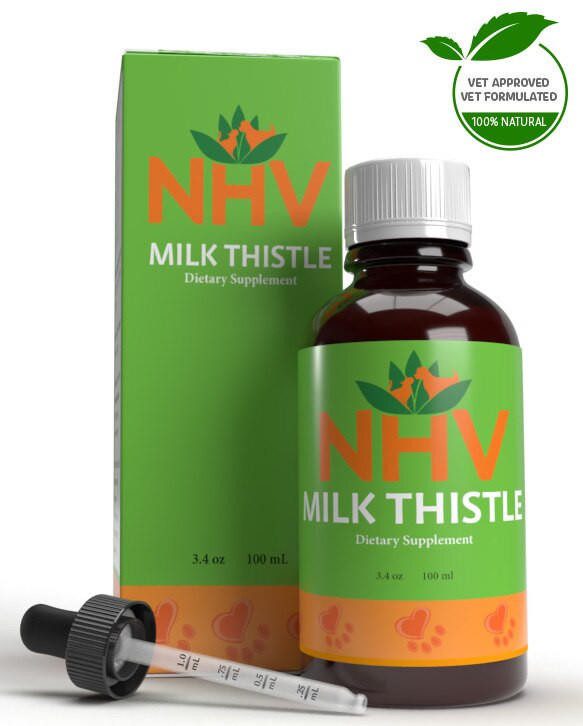
Support for liver and kidney detox and cancer support in dogs
3 month supply for a small to medium size pet
These effects help to remove chemicals and toxins that can accumulate in your dog’s system. It is one of the few herbs with no equivalent in conventional medicine.


These effects help to remove chemicals and toxins that can accumulate in your dog’s system. It is one of the few herbs with no equivalent in conventional medicine.

Milk Thistle is a powerful herb that’s been used by humans for thousands of years. The active ingredient, silymarin, has been shown through scientific studies to possess strong anti-inflammatory, antioxidant, and detoxifying properties. It also promotes cellular regeneration and repair.
This supplement by NHV Natural Pet Products uses 100% natural milk thistle to support dogs through liver and kidney conditions in addition to conventional treatment by their veterinarian.
Milk thistle improves kidney function due to the damage from:
The extraordinary antioxidant properties of milk thistle for dog extract acts to:
The scientific name for milk thistle is Silybum Marianum. It’s also referred to as wild artichoke and holy thistle.
Milk thistle for dog liver support can be used in conjunction with conventional treatments and is glycerin based and safe for long-term use. You can read more about the benefits of using milk thistle on Dr. Hillary Cook’s blog.
At NHV, all of our products including milk thistle for dog kidney support are plant-based and make excellent proactive support for many health conditions. If you have questions on milk thistle for dogs or any of our holistic supplements, you can ask an expert at NHV because we put your pet first when it comes to health and healing naturally.
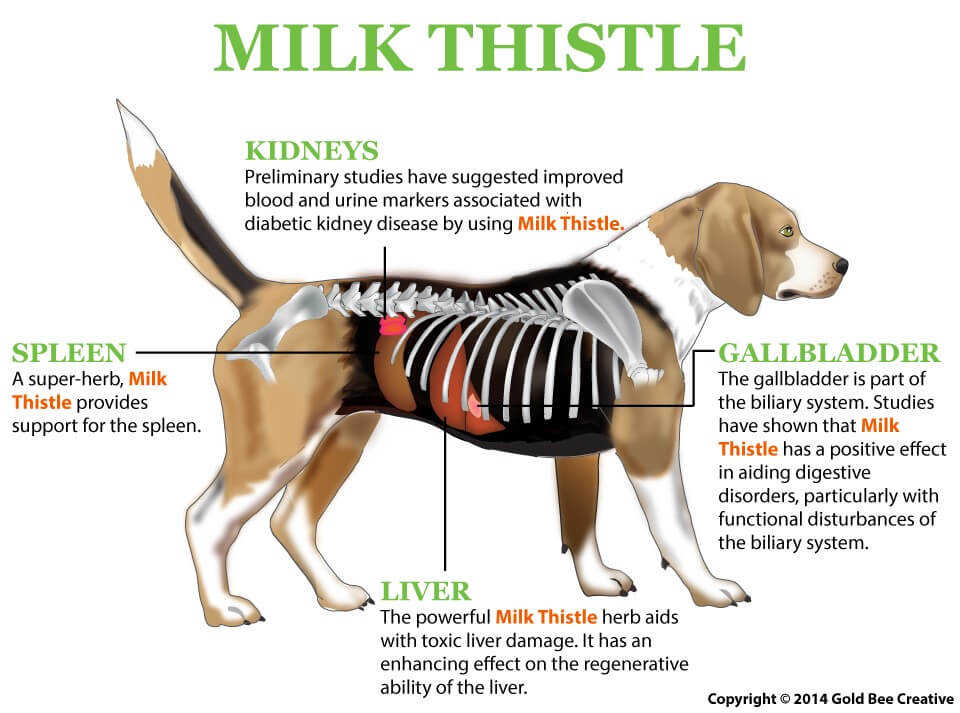
Select your pet's weight to determine the correct dose.
To be taken twice daily. Determine your pet’s weight and then use the easy chart below to determine the correct dose. This is the minimum dosage.
Pet's Weight Dosage
0 - 15 lb = 0.5 ml
16 - 30 lb = 1.0 ml
31 - 45 lb = 1.5 ml
46 - 60 lb = 2.0 ml
61 - 75 lb = 2.5 ml
Over 75 lb = 3.0 ml
How to Administer
Shake well before use. The easiest method is to use the dropper provide and places the drops into your pet’s food or favorite treat. You can also use the dropper and squirt directly into the pet’s mouth.
Some pets can be finicky, if this occurs consider hiding the drops in foods most pet’s love such as fish, chicken or yogurt or a favourite treat. If your pet only eats dry food then soak a few kibbles at feeding time.
For Best Results
Herbal dietary supplements are beneficial to the health and wellbeing of your pet and are safe for long-term use. Every pet responds to natural herbal supplements differently, therefore it is important to be consistent and administer the product daily. Supplements generally take two to four weeks to take effect, however this will vary from one animal to the next.
Product Storage
All NHV Natural Pet Products are pure herbal extracts and contain no artificial additives, preservatives or coloring. Shelf life after opening is 6 months and must be refrigerated after opening.
Cautions and Contraindications
Do not use Milk Thistle in pregnant or nursing animals. Speak to your vet before using our products. A second visit is recommended if your pet’s condition does not improve, or deteriorates after continued use of the supplements.
All information provided by NHV Natural Pet Products is for educational purposes only.
Milk Thistle is a powerful herb that’s been used by humans for thousands of years. The active ingredient, silymarin, has been shown through scientific studies to possess strong anti-inflammatory, antioxidant, and detoxifying properties. It also promotes cellular regeneration and repair.
This supplement by NHV Natural Pet Products uses 100% natural milk thistle to support dogs through liver and kidney conditions in addition to conventional treatment by their veterinarian.
Milk thistle improves kidney function due to the damage from:
The extraordinary antioxidant properties of milk thistle for dog extract acts to:
The scientific name for milk thistle is Silybum Marianum. It’s also referred to as wild artichoke and holy thistle.
Milk thistle for dog liver support can be used in conjunction with conventional treatments and is glycerin based and safe for long-term use. You can read more about the benefits of using milk thistle on Dr. Hillary Cook’s blog.
At NHV, all of our products including milk thistle for dog kidney support are plant-based and make excellent proactive support for many health conditions. If you have questions on milk thistle for dogs or any of our holistic supplements, you can ask an expert at NHV because we put your pet first when it comes to health and healing naturally.

Select your pet's weight to determine the correct dose.
To be taken twice daily. Determine your pet’s weight and then use the easy chart below to determine the correct dose. This is the minimum dosage.
Pet's Weight Dosage
0 - 15 lb = 0.5 ml
16 - 30 lb = 1.0 ml
31 - 45 lb = 1.5 ml
46 - 60 lb = 2.0 ml
61 - 75 lb = 2.5 ml
Over 75 lb = 3.0 ml
How to Administer
Shake well before use. The easiest method is to use the dropper provide and places the drops into your pet’s food or favorite treat. You can also use the dropper and squirt directly into the pet’s mouth.
Some pets can be finicky, if this occurs consider hiding the drops in foods most pet’s love such as fish, chicken or yogurt or a favourite treat. If your pet only eats dry food then soak a few kibbles at feeding time.
For Best Results
Herbal dietary supplements are beneficial to the health and wellbeing of your pet and are safe for long-term use. Every pet responds to natural herbal supplements differently, therefore it is important to be consistent and administer the product daily. Supplements generally take two to four weeks to take effect, however this will vary from one animal to the next.
Product Storage
All NHV Natural Pet Products are pure herbal extracts and contain no artificial additives, preservatives or coloring. Shelf life after opening is 6 months and must be refrigerated after opening.
Cautions and Contraindications
Do not use Milk Thistle in pregnant or nursing animals. Speak to your vet before using our products. A second visit is recommended if your pet’s condition does not improve, or deteriorates after continued use of the supplements.
All information provided by NHV Natural Pet Products is for educational purposes only.
Published: December 19, 2020
2 replies
My 17 y.o. Japanese bobtail cat has a cryptococcak nasal cyst, research shows turmeric is a better anti-fungal than fluconazole but my cat started foaming at the mouth! My concerns are will NHV turmeric cause the same reaction? Dr Nita
We would suggest administering Turmeric (and our supplements in general) with food or with your furry kiddo’s favorite treat for convenience.
Alternatively, you may wish to administer the product via a syringe or dropper directly into the mouth preferably after feeding so that the product is easier on the digestive system.